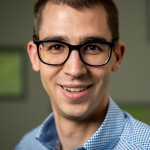Roel Van Beeumen

Positions
- Staff Scientist, Applied Mathematics and Computational Research Division, Berkeley Lab, July 2025 - present.
- Research Scientist, Applied Mathematics and Computational Research Division, Berkeley Lab, June 2019 - June 2025.
- Postdoctoral Fellow, Computational Research Division, Berkeley Lab, September 2016 - May 2019.
- Postdoctoral Researcher, Department of Computer Science, KU Leuven, May 2015 - August 2016.
- PhD Researcher, Department of Computer Science, KU Leuven, October 2011 - April 2015.
Research Interests
- (Nonlinear) Eigenvalue Problems
- Numerical Linear Algebra
- Model Order Reduction
- Numerical Software
- Quantum Computing
Education
- Doctor of Engineering Science (PhD): Computer Science
2011-2015, KU Leuven, Belgium. - Master of Arts in Archaeology
2010-2011, KU Leuven, Belgium. - Master of Engineering: Mathematical Engineering
2008-2010, KU Leuven, Belgium. - Bachelor of Archaeology
2006-2010, KU Leuven, Belgium. - Bachelor of Engineering: Mechanical Engineering
2005-2008, KU Leuven, Belgium.
Preprints
- Y. Shen, D. Camps, S. Darbha, A. Szasz, K. Klymko, D.B. Williams-Young, N.M. Tubman, R. Van Beeumen
"Estimating eigenenergies from quantum dynamics: A unified noise-resilient measurement-driven approach"
arXiv:2306.01858 - E. Kökcü, D. Camps, L. Bassman Oftelie, W.A. de Jong, R. Van Beeumen, A.F. Kemper
"Algebraic compression of free fermionic quantum circuits: Particle creation, arbitrary lattices and controlled evolution"
arXiv:2303.09538 - R. Van Beeumen, D. Camps, N. Mehta
"QCLAB++: Simulating quantum circuits on GPUs"
arXiv:2303.00123 - D. Camps, L. Lin, R. Van Beeumen, C. Yang
"Explicit quantum circuits for block encodings of certain sparse matrices"
arXiv:2203.10236
For a complete list see here.
Software
- QCLAB: object-oriented MATLAB toolbox for creating and representing quantum circuits.
https://github.com/QuantumComputingLab/qclab - QCLAB++: object-oriented, fully templated C++ package for creating and representing quantum circuits.
https://github.com/QuantumComputingLab/qclabpp - Fast Free Fermion Compiler (F3C): MATLAB toolbox for compiling time-evolution quantum circuits of spin Hamiltonians that can be mapped to free fermions.
https://github.com/QuantumComputingLab/f3c - Fast Free Fermion Compiler (F3C++): C++ package for compiling time-evolution quantum circuits of spin Hamiltonians that can be mapped to free fermions.
https://github.com/QuantumComputingLab/f3cpp
Journal Articles
Roel Van Beeumen, Lana Periša, Daniel Kressner, Chao Yang, "Solving a class of infinite‐dimensional tensor eigenvalue problems by translational invariant tensor ring approximations", Numerical Linear Algebra with Applications, July 24, 2024, 31:22573, doi: 10.1002/nla.2573
Jan Balewski, Mercy G Amankwah, Roel Van Beeumen, E Wes Bethel, Talita Perciano, Daan Camps, "Quantum-parallel vectorized data encodings and computations on trapped-ion and transmon QPUs", Journal, February 10, 2024, 14, doi: https://doi.org/10.1038/s41598-024-53720-x
Daan Camps, Lin Lin, Roel Van Beeumen, Chao Yang, "Explicit quantum circuits for block encodings of certain sparse matrices", SIAM Journal on Matrix Analysis and Applications, January 1, 2024, 45:801-827, doi: 10.1137/22M1484298
E Wes Bethel, Mercy G Amankwah, Jan Balewski, Roel Van Beeumen, Daan Camps, Daniel Huang, Talita Perciano, "Quantum computing and visualization: A disruptive technological change ahead", Journal, November 6, 2023, 43, doi: https://doi.org/10.1109/MCG.2023.3316932
M. G. Amankwah, D. Camps, E. W. Bethel, R. Van Beeumen, T. Perciano, "Quantum pixel representations and compression for N-dimensional images", Nature Scientific Reports, May 11, 2022, 12:7712, doi: 10.1038/s41598-022-11024-y
Roel Van Beeumen, Khaled Z. Ibrahim, Gregory D. Kahanamoku-Meyer, Norman Y. Yao, Chao Yang, "Enhancing Scalability of a Matrix-Free Eigensolver for Studying Many-Body Localization", The International Journal of High Performance Computing Applications, March 19, 2022, 36:307-319, doi: 10.1177/10943420211060365
Daan Camps, Roel Van Beeumen, "Approximate quantum circuit synthesis using block encodings", PHYSICAL REVIEW A, November 11, 2020, 102, doi: 10.1103/PhysRevA.102.052411
One of the challenges in quantum computing is the synthesis of unitary operators into quantum circuits with polylogarithmic gate complexity. Exact synthesis of generic unitaries requires an exponential number of gates in general. We propose a novel approximate quantum circuit synthesis technique by relaxing the unitary constraints and interchanging them for ancilla qubits via block encodings. This approach combines smaller block encodings, which are easier to synthesize, into quantum circuits for larger operators. Due to the use of block encodings, our technique is not limited to unitary operators and can be applied for the synthesis of arbitrary operators. We show that operators which can be approximated by a canonical polyadic expression with a polylogarithmic number of terms can be synthesized with polylogarithmic gate complexity with respect to the matrix dimension.









